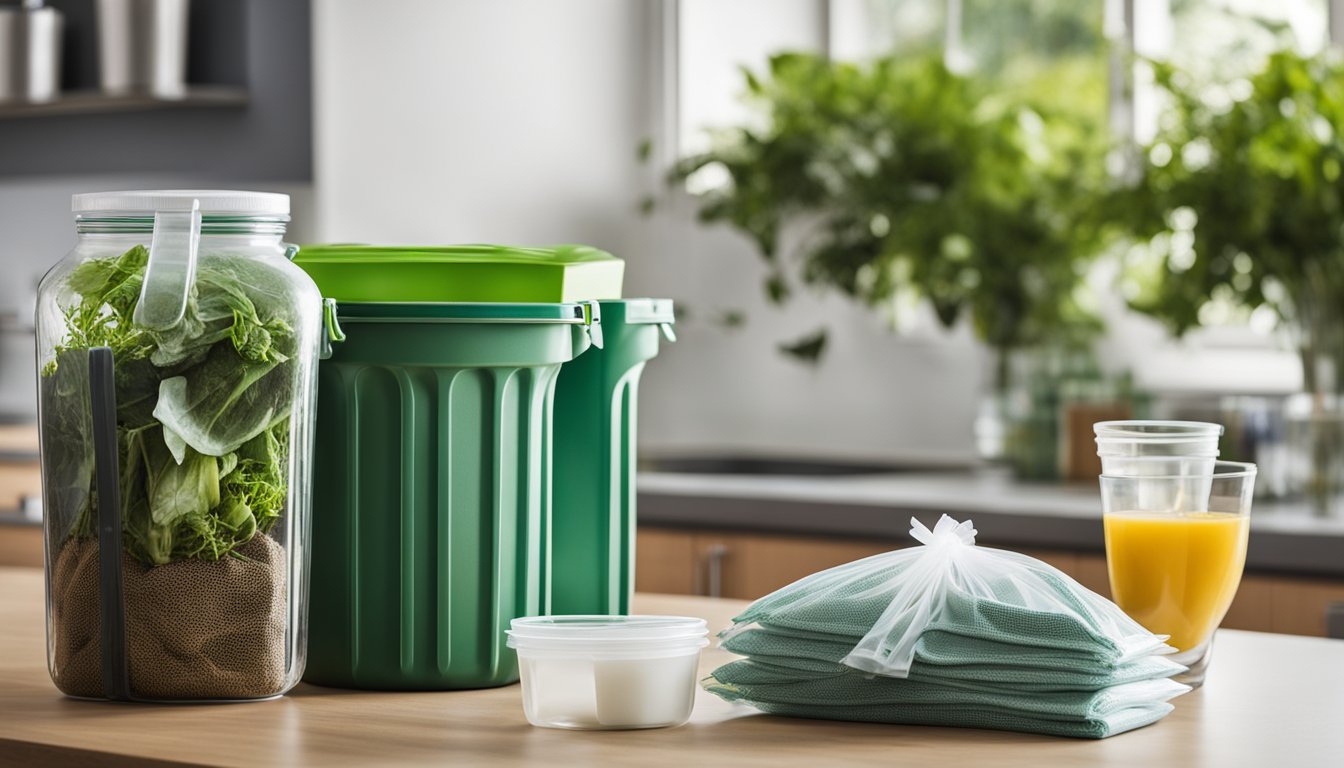Late updated: 10 Aug 2024 14:08
Written by: Sarah Hollister
Simple Swaps For An Eco-Friendly Lifestyle: Easy Changes For Greener Living
Living a more sustainable lifestyle doesn’t have to be daunting. We can make impactful changes by integrating simple, eco-friendly swaps in our daily routines. From swapping out plastic bags for reusable silicone ones to using energy-efficient LED lights, these small adjustments can significantly reduce our environmental footprint.

One of the easiest and most effective ways to move towards a zero-waste lifestyle is to replace single-use plastics with reusable alternatives. For example, Stasher’s silicone bags can replace traditional plastic bags, offering a practical, durable, and eco-friendly option for food storage. These bags are versatile, being dishwasher-safe, freezer-friendly, and microwave-ready, which makes them a convenient choice for eco-conscious individuals.
Another simple yet effective swap involves upgrading our home lighting. Switching out incandescent or fluorescent bulbs for LED lights not only cuts down on energy consumption but also reduces our electricity bills. These small changes may seem minor but when adopted on a larger scale, they contribute significantly to fostering a sustainable living environment.
Key Takeaways
- Small, eco-friendly swaps can reduce our environmental footprint.
- Replacing single-use plastics with reusable alternatives is impactful.
- Switching to LED lights cuts energy use and lowers costs.
Embracing Eco-Friendly Products in Daily Life
Making sustainable choices in our daily routines can significantly reduce environmental impact. By integrating eco-friendly products into our kitchen, bathroom, and general household practices, we can contribute to a more sustainable lifestyle.
Kitchen Upgrades for Sustainability
Switch to Reusable Containers
Using glass containers and mason jars instead of single-use plastic helps reduce waste. Stasher bags, which are silicone-based, serve as excellent alternatives to traditional plastic bags, being freezer-friendly and dishwasher-safe.
Opt for Natural Cleaning Products
Commercial dish soaps often contain harsh chemicals. We can make our own natural cleaning products using basic ingredients like vinegar and baking soda. This not only cuts down on plastic packaging but also ensures a healthier living environment.
Embrace Beeswax Wraps
Instead of plastic wrap, beeswax wraps are a sustainable choice for food storage. They are reusable and biodegradable, which makes them a great zero waste swap. These wraps can be used for wrapping sandwiches, covering bowls, and storing cut produce.
Sustainable Bathroom Practices
Use Bamboo Toothbrushes
Traditional plastic toothbrushes contribute significantly to landfill waste. Replacing them with bamboo toothbrushes can be a simple yet effective way to minimise our ecological footprint.
Consider Refillable and Natural Products
Switching to refillable cleaning products and using natural ingredients for hygiene can drastically reduce single-use plastic. Items like shampoo bars or toothpaste tablets are sustainable alternatives that come with compostable or recyclable packaging.
Invest in Reusable Menstrual Products
Single-use menstrual products produce an enormous amount of waste. Alternatives such as menstrual cups, reusable pads, or period underwear made from organic cotton and other sustainable materials are more eco-friendly and often more cost-effective in the long run.
Household Essentials with Less Impact
Replace Disposable Items with Reusable Versions
Switching from paper towels to reusable cloths or rags can help minimise waste. Cloth napkins and reusable bags for shopping are also excellent sustainable swaps.
Choose Energy-Efficient Lighting
Replacing traditional bulbs with LED bulbs is a straightforward way to reduce energy consumption. These bulbs last longer and are more efficient, contributing to a reduced carbon footprint.
Prioritise Quality Over Quantity
Investing in durable, high-quality items rather than frequently buying cheaper, disposable products can reduce waste and resource usage. For instance, using a safety razor instead of disposable razors lowers plastic waste and overall consumption.
Incorporating these practices into our daily lives can make a significant difference. By choosing sustainable options, we not only benefit our environment but also nurture a healthier, more responsible way of living.
Behavioural Changes for a Greener Tomorrow

Adopting eco-friendly habits helps reduce our carbon footprint and supports a sustainable future. By focusing on mindful shopping and consumption, alongside community and transport solutions, we can significantly impact the environment positively.
Shopping and Consumption Habits
One effective way to lower our environmental impact is by rethinking our shopping habits. Reusable bags significantly cut down on plastic grocery bags, often ending up in landfills and harming wildlife. Opting for items with minimal packaging, or buying in bulk, reduces waste dramatically.
Choosing reusable containers over single-use plastics and using steel straws minimise plastic pollution. Additionally, purchasing eco-friendly household products not only supports sustainable businesses but also avoids chemicals harmful to both our health and the environment.
Avoiding greenwashing is also crucial. Many products falsely claim to be eco-friendly, so it's important to research and choose genuinely sustainable options. Practicing zero-waste principles, such as composting food scraps, ensures we limit what ends up in landfills, further contributing to a greener lifestyle.
Community and Transport Solutions
Integrating eco-friendly practices within our communities can create a substantial environmental impact. Encouraging the use of public transportation helps reduce greenhouse gas emissions. Sharing rides and using electric or hybrid cars can also make a significant difference.
Supporting local farmers and markets reduces the carbon footprint associated with transporting food over long distances. This not only supports local economies but also decreases food waste and the use of plastic packaging.
Promoting cycling and walking as primary modes of transport within communities lessens pollution and benefits public health. Setting up communal recycling programmes and participating in local environmental initiatives can foster a culture of sustainability. By implementing these changes, we contribute to reducing pollution and combatting deforestation, paving the way for a healthier planet.
Frequently Asked Questions

In this section, we address common queries about making simple, eco-friendly swaps. These questions and answers are designed to guide you towards a more sustainable lifestyle with minimal effort and cost.
What everyday products can be replaced with sustainable alternatives to reduce waste?
We can replace paper towels with cloth towels. Cloth towels are reusable and can significantly cut down waste. For instance, using a set of 20 dish towels for around £20-£25 can save us £100-£200 annually on paper towel costs.
Which easy substitutions can one make to adopt a more eco-friendly home?
In the kitchen, switching from plastic containers to mason or tin jars is a simple yet effective swap. These jars are durable, reusable, and ideal for storing food or beverages. Using eco-friendly soap bars made with natural ingredients can replace bottled liquid soaps, reducing plastic waste.
How can making small changes in daily habits lead to a positive environmental impact?
Small changes such as using reusable shopping bags, avoiding single-use plastics, and opting for public transport can collectively make a significant environmental impact. These habits reduce waste, conserve resources, and lower our carbon footprint.
What are the best cost-effective eco-friendly products for a zero-waste home?
We can invest in a cast iron skillet, which is durable and versatile, making it a staple in every eco-friendly kitchen. Additionally, reusable shopping bags, bamboo toothbrushes, and metal straws are cost-effective alternatives that support a zero-waste lifestyle.
In what ways can we eliminate single-use plastics with eco-friendly options?
Using reusable water bottles and coffee cups, opting for beeswax wraps instead of plastic cling film, and choosing bamboo cutlery over disposable plastic utensils are effective ways to eliminate single-use plastics from our daily lives.
What are efficient examples of sustainable living for urban residents?
Urban residents can practice sustainable living by utilising public transport or bicycles instead of cars. Growing potted plants or small herb gardens on windowsills can improve air quality and provide fresh produce. Additionally, participating in local recycling programmes helps manage waste more efficiently.
